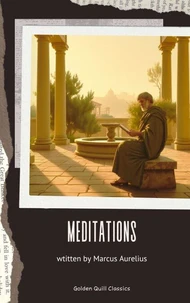Marcus Aurelius' Meditations stands as one of the most profound expressions of Stoic philosophy, composed privately by a Roman emperor seeking moral clarity amid war, plague, and political duty. Written in Greek as a series of self-addressed reflections, the work explores how to live in harmony with nature and reason, cultivating inner freedom through virtue and self-discipline. Across its twelve books, Marcus repeatedly reminds himself that the only true good is moral integrity, that external events are indifferent, and that serenity arises from mastering one's thoughts and actions rather than controlling the world.
He meditates on impermanence, the fleeting nature of fame, and the acceptance of death as a natural process, using these insights to strengthen compassion, patience, and justice in governance. His reflections form a daily spiritual practice-a "philosophy in action"-through which he strives to maintain simplicity and self-control while wielding imperial power. The Meditations reveal a ruler who turns inward for guidance, transforming Stoic doctrine into lived wisdom.
Beyond its historical setting, the work endures as a universal guide to resilience, ethical leadership, and the search for peace through reason, reminding readers that mastery of the self is the truest form of sovereignty. Through detailed textual analysis and engagement with academic interpretations, the annotations of Nicolae Sfetcu illuminates how the Meditations encapsulates Stoic wisdom in the hands of a "philosopher-king." It concludes that Marcus' sincere attempt to integrate virtue with rulership has secured his legacy as an exemplar of philosophical leadership in Western tradition.
Marcus Aurelius' Meditations stands as one of the most profound expressions of Stoic philosophy, composed privately by a Roman emperor seeking moral clarity amid war, plague, and political duty. Written in Greek as a series of self-addressed reflections, the work explores how to live in harmony with nature and reason, cultivating inner freedom through virtue and self-discipline. Across its twelve books, Marcus repeatedly reminds himself that the only true good is moral integrity, that external events are indifferent, and that serenity arises from mastering one's thoughts and actions rather than controlling the world.
He meditates on impermanence, the fleeting nature of fame, and the acceptance of death as a natural process, using these insights to strengthen compassion, patience, and justice in governance. His reflections form a daily spiritual practice-a "philosophy in action"-through which he strives to maintain simplicity and self-control while wielding imperial power. The Meditations reveal a ruler who turns inward for guidance, transforming Stoic doctrine into lived wisdom.
Beyond its historical setting, the work endures as a universal guide to resilience, ethical leadership, and the search for peace through reason, reminding readers that mastery of the self is the truest form of sovereignty. Through detailed textual analysis and engagement with academic interpretations, the annotations of Nicolae Sfetcu illuminates how the Meditations encapsulates Stoic wisdom in the hands of a "philosopher-king." It concludes that Marcus' sincere attempt to integrate virtue with rulership has secured his legacy as an exemplar of philosophical leadership in Western tradition.

 , qui est-ce ?
, qui est-ce ?